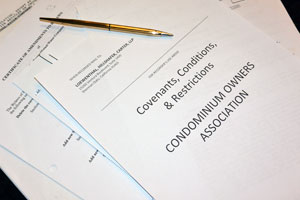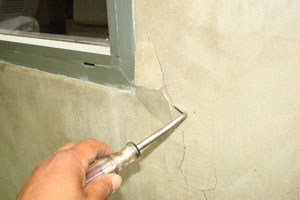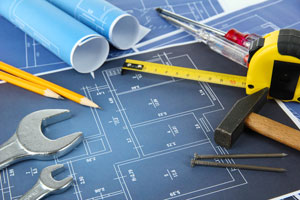The intent of SB800 is to facilitate and improve the resolution of construction defect claims. SB800 applies to single-family homes, condominiums and town homes originally sold on or after January 1, 2003, and is binding on all original purchasers and their successors in interest. The bill identifies new procedures for taking action against builders, architects and subcontractors for construction defects.
CONSTRUCTION DEFECTS INCLUDE:
1. WATER INTRUSION
(windows, patio doors, deck doors, roofs, chimney caps, decks, balconies)
2. STRUCTURAL
(foundations, slabs, stucco, exterior siding, exterior walls, soils)
3. HARD SCAPE
(paths, patios, irrigation, landscaping, drainage)
4. FIRE PROTECTION
(fireplaces, chimneys, electrical, mechanical)
A builder shall provide a homebuyer with a minimum one-year express written limited warranty covering the fit and finish of cabinets, mirrors, flooring, interior and exterior walls, countertops, paint finishes and trim. A builder may, but is not required to, offer greater protection or protection for longer time periods in its express contract with the homeowner.
CHANGE OF STATUTE OF LIMITATIONS: (ALL TIME PERIODS ARE FROM CLOSE OF ESCROW)
1. ONE YEAR
(noise transmission, irrigation systems, drainage)
2. TWO YEARS
(untreated wood posts, landscaping systems, dryer ducts)
3. FOUR YEARS
(plumbing, sewer, electrical, concrete flatwork, untreated steel fences)
PRELITIGATION PROCEDURES
Prior to filing a lawsuit, the following procedures MUST be followed.
1. The builder must receive written notice describing the claim in sufficient detail so that the builder can determine the nature and location of the violations.
2. Within 14 days, builder shall acknowledge, in writing, receipt of the notice of the claim. If the builder fails to acknowledge receipt of claim, buyer is released from these requirements and may file a lawsuit.
3. The builder can elect an initial inspection and/or testing of the home, to be completed within 14 days of his acknowledgment of receipt of the buyer s claim. The builder may also request a second test within 40 days. If the builder fails to timely demand inspection or testing, homeowner may file suit.
4. Within 30 days, the builder shall provide copies of all relevant plans and specifications that pertain to the homeowner s residence.
5. The builder may offer to repair the defects or compensate homeowner for all the applicable damages. Then, the homeowner shall have 30 days to authorize the builder to proceed with repairs. The homeowner may also request that the builder provide 3 additional contractors who will do the repair.
6. The builder s offer to repair shall also be accompanied by an offer to mediate (limited to 4 hours) the dispute. If the builder has made an offer to repair the violation, and mediation has failed to resolve dispute, homeowner shall allow repair to be performed. Mediation shall occur within 15 days.
7. The builder must perform repairs with the utmost diligence . Every effort shall be made to complete repairs within 120 days. If the builder fails to complete repairs within this time frame, the homeowner is released from these requirements and may file a suit. The builder may also make an all cash offer to settle instead of making repairs. The homeowner can accept the offer or reject it and file suit.
8. The statute of limitations are extended from the date of the original claim to 100 days after the repairs are completed. When the repairs are completed, the homeowner may file an action for violation of an applicable standard and/or for inadequate repairs.
9. If the builder has completed the repair, and before the homeowner may file a lawsuit, the buyer shall request mediation in writing, which shall occur within 15 days of the written request.
If a claim for DAMAGES is made, the homeowner is only entitled to the following:
1. Reasonable value of repairing any violation
2. Reasonable cost of repairing any damages caused by the repair efforts
3. Repairing and rectifying any damages resulting from the failure of the home to meet the standards
4. Reasonable cost of removing and replacing any improper repair by the builder
5. Reasonable relocation and storage expenses
6. Lost business income if the home was used as a principal place of business licensed to be operated from the home
7. Reasonable investigative costs for each established violation, and all other costs or fees recoverable by contract or statute
BUILDER’S DEFENSE
The builder’s defense may include, but is not limited to, unforseen acts of nature; the buyer’s unreasonable failure to mitigate damages or to provide access for inspections, alterations by the buyer, expiration of statutes of limitations, a successful repair by the builder, failure to give timely notice to the builder, failure to follow the builder’s recommendations, or commonly-accepted homeowner maintenance obligations.


